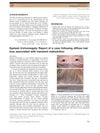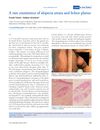 33 citations,
April 2017 in “American journal of clinical dermatology”
33 citations,
April 2017 in “American journal of clinical dermatology” Early treatment of superficial fungal infections in immunocompromised patients is crucial.
 53 citations,
March 2014 in “Cold Spring Harbor Perspectives in Medicine”
53 citations,
March 2014 in “Cold Spring Harbor Perspectives in Medicine” The document explains different types of hair loss, their causes, and treatments, and suggests future research areas.
 4 citations,
June 2021 in “Wounds-a Compendium of Clinical Research and Practice”
4 citations,
June 2021 in “Wounds-a Compendium of Clinical Research and Practice” Chronic scalp lesions with crusts and pus that heal with strong topical steroids suggest Erosive Pustular Dermatosis, confirmed by biopsy showing specific immune cells.
29 citations,
June 2020 in “International Journal of Molecular Sciences” Notch signaling disruptions can cause various skin diseases.
13 citations,
January 2018 in “Yonsei Medical Journal” A specific gene mutation causes Olmsted syndrome.
10 citations,
July 2014 in “Annals of Saudi Medicine” A 30-year-old man with rare skin conditions improved with antibiotics and surgery, hinting at a link to rosacea.
 6 citations,
October 2022 in “American journal of clinical dermatology”
6 citations,
October 2022 in “American journal of clinical dermatology” The review shows how to properly diagnose and treat the loss of eyebrow and eyelash hair.
 4 citations,
July 2013 in “Journal of dermatology”
4 citations,
July 2013 in “Journal of dermatology” Malnutrition can cause unusual eyelash growth and hair loss.
April 2023 in “International journal of molecular sciences” People with Collagen VI-related myopathies may often have hair loss and scalp issues.
 8 citations,
November 2015 in “The American journal of dermatopathology/American journal of dermatopathology”
8 citations,
November 2015 in “The American journal of dermatopathology/American journal of dermatopathology” Punctate follicular porokeratosis is a skin condition with specific features seen in hair follicles.
 9 citations,
February 2011 in “Biologics: Targets & Therapy”
9 citations,
February 2011 in “Biologics: Targets & Therapy” Topical calcineurin inhibitors, especially 0.1% tacrolimus ointment, are effective and well-tolerated for treating cutaneous lupus erythematosus but require more research for standard treatment guidelines.
 December 2012 in “Journal of Dermatological Science”
December 2012 in “Journal of Dermatological Science” Wnt/beta-catenin signaling in the skin helps fat cell development during hair growth and repair.
 March 2019 in “Nasza Dermatologia Online”
March 2019 in “Nasza Dermatologia Online” A man had both alopecia areata and lichen planus, which is uncommon.
11 citations,
January 2018 in “IET Nanobiotechnology” The scaffolds significantly sped up wound healing in dogs and were safe.
 April 2021 in “International Journal of Research in Dermatology”
April 2021 in “International Journal of Research in Dermatology” A child with a rare scalp condition regrew hair after treatment.
 August 2020 in “Egyptian Veterinary Medical Society of Parasitology Journal (EVMSPJ)”
August 2020 in “Egyptian Veterinary Medical Society of Parasitology Journal (EVMSPJ)” 10.5% of sheep in Ismailia, Egypt, had Sarcoptes scabiei, causing skin issues.
April 2024 in “International journal of molecular sciences” Alopecia areata and vitiligo share immune system dysfunction but differ in specific immune responses and affected areas.
 6 citations,
December 2022 in “Cell reports”
6 citations,
December 2022 in “Cell reports” Eating a high-fat fish oil diet caused mice to lose hair due to a specific immune cell activity in the skin linked to a protein called E-FABP.
1 citations,
August 2005 in “Springer eBooks” Alopecia areata is an autoimmune disease with genetic links, treatable with certain medications, and can affect mental health.
 1 citations,
November 2023 in “iScience”
1 citations,
November 2023 in “iScience” A protein called desmoglein 3 is important for keeping hair follicle stem cells inactive and helps in their regeneration.
 50 citations,
January 2016 in “The FEBS journal”
50 citations,
January 2016 in “The FEBS journal” RANK is a key target in breast cancer treatment due to its role in tumor growth and bone metastasis.
 23 citations,
December 2021 in “Frontiers in Immunology”
23 citations,
December 2021 in “Frontiers in Immunology” IL-1 family cytokines are crucial for skin defense and healing, but their imbalance can cause skin diseases.
15 citations,
June 2020 in “The journal of investigative dermatology/Journal of investigative dermatology” Mice with extra human KLK14 had hair and skin problems, including weaker cell bonds and inflammation, linked to Netherton syndrome.
 306 citations,
April 2019 in “International Journal of Molecular Sciences”
306 citations,
April 2019 in “International Journal of Molecular Sciences” The skin has a complex immune system that is essential for protection and healing, requiring more research for better wound treatment.
 70 citations,
February 2017 in “Dermatologic Surgery”
70 citations,
February 2017 in “Dermatologic Surgery” Treatment with plasma rich in growth factors improved hair density and thickness for hair loss patients.
 2 citations,
July 2022 in “Dermatology Reports”
2 citations,
July 2022 in “Dermatology Reports” EPDS and MS might share an immune-related cause.
36 citations,
June 2015 in “International journal of toxicology” Trichloroethylene causes skin inflammation in mice by increasing certain immune proteins.
 September 2017 in “The journal of investigative dermatology/Journal of investigative dermatology”
September 2017 in “The journal of investigative dermatology/Journal of investigative dermatology” Scarred skin in lichen planopilaris loses immune cells due to a decrease in a specific protein in skin cells.
 2 citations,
July 2013 in “InTech eBooks”
2 citations,
July 2013 in “InTech eBooks” Scalp biopsy helps tell apart permanent and temporary hair loss types and guides treatment.
 34 citations,
October 2017 in “Archivos Argentinos De Pediatria”
34 citations,
October 2017 in “Archivos Argentinos De Pediatria” Alopecia Areata is a complex, unpredictable autoimmune hair loss condition with limited treatment options and a significant psychological impact.





















